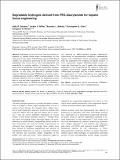Degradable hydrogels derived from PEG-diacrylamide for hepatic tissue engineering
Author(s)
Miller, Jordan S.; Blakely, Brandon L.; Chen, Christopher S.; Stevens, Kelly R.; Bhatia, Sangeeta N
DownloadDegradable hydrogels.pdf (666.7Kb)
PUBLISHER_CC
Publisher with Creative Commons License
Creative Commons Attribution
Terms of use
Metadata
Show full item recordAbstract
Engineered tissue constructs have the potential to augment or replace whole organ transplantation for the treatment of liver failure. Poly(ethylene glycol) (PEG)-based systems are particularly promising for the construction of engineered liver tissue due to their biocompatibility and amenability to modular addition of bioactive factors. To date, primary hepatocytes have been successfully encapsulated in non-degradable hydrogels based on PEG-diacrylate (PEGDA). In this study, we describe a hydrogel system based on PEG-diacrylamide (PEGDAAm) containing matrix-metalloproteinase sensitive (MMP-sensitive) peptide in the hydrogel backbone that is suitable for hepatocyte culture both in vitro and after implantation. By replacing hydrolytically unstable esters in PEGDA with amides in PEGDAAm, resultant hydrogels resisted non-specific hydrolysis, while still allowing for MMP-mediated hydrogel degradation. Optimization of polymerization conditions, hepatocellular density, and multicellular tissue composition modulated both the magnitude and longevity of hepatic function in vitro. Importantly, hepatic PEGDAAm-based tissues survived and functioned for over 3 weeks after implantation ectopically in the intraperitoneal (IP) space of nude mice. Together, these studies suggest that MMP-sensitive PEGDAAm-based hydrogels may be a useful material system for applications in tissue engineering and regenerative medicine.
Date issued
2015-04Department
Harvard University--MIT Division of Health Sciences and Technology; Massachusetts Institute of Technology. Department of Electrical Engineering and Computer ScienceJournal
Journal of Biomedical Materials Research Part A
Publisher
Wiley Blackwell
Citation
Stevens, Kelly R.; Miller, Jordan S. and Blakely, Brandon L. “Degradable Hydrogels Derived from PEG-Diacrylamide for Hepatic Tissue Engineering.” Journal of Biomedical Materials Research Part A 103, 10 (April 2015): 3331–3338. © 2015 The Authors
Version: Final published version
ISSN
1549-3296
1552-4965